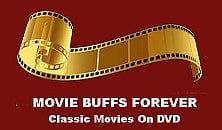Great Movies of the Golden Age – Part 8
Posted on 22 May 00:00 
The golden age era refers to the period Hollywood blossomed and matured. It was the time the film industry picked and movie buffs were presented with high-quality cinematic productions. The major events that changed the movie industry and ushered in the golden age era include improvements in movie-making technology and growth in production houses. Furthermore, theatrical performances and silent movies had created a pool of talented actors.
'Follow the Fleet' is a musical comedy with a plot based on the lives of two former dance partners. Seaman Baker (Fred Astaire) and Sherry (Ginger Rogers) are separated dance partners. Baker had to join the navy while Sherry was working as a dance hostess in Francisco. Baker visits the dancing ballroom together with his friend Bilge (Randolph Scott) and this creates an opportunity for her to reunite with her old friend.
Bilge is attracted to Connie (Harriet Hilliard), Sherry’s sister. Connie then begins to talk about marriage, before Bilge quickly directs his attention towards Sherry’s friend.
Baker and his friend return to sea as Connie seek to raise money to save her deceased sea-captain father’s sailing ship. Later, the two friends go back to San Francisco, and Baker tries to get Sherry a job as a Broadway performer. However, Baker fails to secure the job because of some misunderstandings about his past dealings.
Baker redeems himself by throwing a benefit show to raise the last seven hundred dollars he needed to refurbish the ship. However, he fails to rejuvenate the ship. Blige is a Chief Petty Officer. He is ordered to find and arrest his friend Baker, but he allows him to complete the show before doing so.
Mark Sandrich directed the movie which received positve critic reviews.
'Fort Apache' is based on a true event that happened during the American Civil War. In the movie, Captain Kirby York (John Wayne) is promoted to replace the outgoing commander at Fort Apache. York has experience commanding a platoon during the civil war. This qualified him to head the U.S cavalry post at Fort Apache. However, the position was given to Lieutenant Colonel Owen Thursday (Henry Fonda).
Thursday graduated from West Point College and was a general during the Civil War. Colonel Thursday is an arrogant and egocentric officer who has no experience in dealing with Native Americans. He does not understand the unique cultures and traditions of the local tribes.
He is also a widower who brings his daughter Philadelphia (Shirley Temple) with him. Thursday’s daughter is attracted to the Second Lieutenant Michael Shannon O’Rourke (John Agar). O’Rourke is the son of Sergeant Major Michael O’Rourke (Ward Bond). The Sergeant was the recipient of the Medal of Honor for his performance as a major with the Irish Brigade during the Civil War. This powder keg leads to disaster.
John Ford directed the film that earned recognition from the American Film Institute.
'12 Angry Men' is a legal drama with the plot based in a New York Court filled with an overheated jury room. The jury is preparing to hear the case of a poor youth (the defendant) accused of killing his father by stabbing him. The judge tells them that if they find any reasonable doubt, they must declare the accused not guilty.
However, the jurors state that if they find the defendant guilty, they will return a death sentence. For the jurors to pass a judgment, it must be a unanimous one. Initially, the evidence presented in court appeared convincing. One of the neighbors testifies that he saw the defendant stab his father. His father's body fell on the floor and the defendant was seen fleeing the scene.
The defendant has a history of violence and had bought a knife similar to the one found at the crime scene. He claims that he had lost the knife. Nevertheless, the knife found at the crime scene had been cleaned of fingerprints. The jurors initially think that the decision is a straightforward one. However, juror number 8 (Henry Fonda) votes not guilty because he felt that they needed more time to deliberate before making the final decision. A verdict is ultimately rendered.
Sidney Lumet directed the movie that received positive reviews from the critiques and is considered a classic movie by many. The film was nominated for Academy Awards in the categories of the best director, best picture, and the best writing of the adapted screenplay.
'The longest Day' is a war film shot in a documentary style. The film begins by replaying the event that preceded the events that took place on the D-day. The events took place on both sides of the English Channel. The Allies were waiting for the bad weather to subside as they predict the movement of the Axis forces that were defending northern France.
Meanwhile, the Supreme Commander of SHAEF, General Dwight Eisenhower decides to review the reports of the bad weather. He also examined the reports on the division within the German High Command to determine the place an invasion is likely to happen. The General also brainstorms the possible responses in case they’re under attack.
The film then documents the events that took place in the early hours of June 6. We see an airborne Allied troop dispatched to main locations inland, away from the beaches. The French are shown actively resisting the news reports that the invasion had started. The documentary also captures the events that precipitated the D-Day.
Ken Annakin, Andrew Marton, and Bernhard Wicki directed the movie. The movie won several awards that included the Academy Awards for the best cinematography and best special effects.
'The Misfits' is a drama with a plot centering on the life of a newly divorced woman (Marilyn Monroe as Roslyn Tabor) and the time she spends in Reno and Northern Nevada. She spents her time together with Isabelle Steers (Thelma Ritter), her friendly landlady, Gay Landland (Clark Gable), an old school cowboy. The pilot, Guido (Eli Wallach) also joins them Nevada desert.
Roslyn Tabor (Marilyn Monroe) is a thirty-year woman who has filed for a quick divorce from her husband Raymond Tabor(Kevin McCarthy). Tabor visits the Washoe County Courthouse together with her landlady Isabell (Ritter). Roslyn ignores Raymond when he tries to reconcile with her and instead decides to stay with Isabelle.
Isabelle is also divorced. She waits for Roslyn to finish filling the divorce paper before taking her to a cocktail lounge. They enjoy drinks as Roslyn processes the reality of her divorce. While at the bar, they meet an older cowboy called Gaylord Langland (Gable) and his best friend Guido (Wallach). They have a friendly conversation and the two friends invite the two ladies to Guido’s old house in Nevada. The ladies accept the invitation, and many adventures and misadventures ensue.
John Huston directed the movie that was considered a box office disaster. However, the movie has aged well, and is now a revered classic, and Clark Gable's last film before his death.
'Cain and Mabel' is a romantic comedy with a plot based on the life of a waitress turned into a Broadway star. Mabel O’Dare (Marion Davies) and Larry Cain (Clarke Gable) are two performers that cannot stand each other, but their press agent, Aloysius K. Reilly (Roscoe Karns), fakes a romance between the two. Consequently, the two fall in love with each other. They plan to get married and Mabel says that she will quit show business to become a housewife. Cain is also planning to stop performing to open a garage in New Jersey.
People working with Cain and Mabel get wind of their plan and inform reporters. The reporters publish the story in the newspaper. This makes the couple think that the other spilled the beans. Things between the couple changes for the better when Mabel’s aunt (Ruth Donnelly).
Lloyd Bacon directed the movie that was nominated for the Academy Award for the Best Dance Direction.
'Red Dust' is an American romantic comedy with a plot based on a love triangle. The theme is set in a rubber plantation in French Indochina during the monsoon season. The love triangle involves a plantation owner Dennis Carson (Clark Gable), a hooker called Vantine (Jean Harlow), and the wife of an engineer Barbara Willis (Mary Astor).
Carson ends his informal relationship with Vantine in favor of Barbara. However, he later realizes he had only an infatuation with Barbara and goes back to Vantine who is truly his match.
Victor Fleming directed the movie.
Conclusion
Screenplay writers and novelists played a prominent role in the creation of classic movies in the Golden Age era. A good number of classic hits from this era were adapted from novels. And, Hollywood wouldn’t have created the Golden Age era without the contributions of talented film directors, actors and actresses.
Movie Buffs Forever stocks classic movies on DVD from the 1940's to the early 2000's. Browse our vast collection of old, rare and out of print classic movies on DVD.
YOU MAY ALSO LIKE:
Why We Still Love DVDs

